Poets and Pancakes – CBSE Class 12 English Flamingo book Chapter 6 Poets and Pancakes Summary and Detailed explanation of the lesson along with the meanings of difficult words. Also, the explanation is followed by a Summary of the lesson. All the exercises and Questions and Answers given at the back of the lesson have been covered

Poets and Pancakes Introduction
The lesson is taken from the book ‘My Years with the boss’ written by Asokamitran. In this excerpt, he talks about all the elements that kept Gemini Studios running. From Pancake make-up to the office boy of the make-up department, from Subbu to the lawyer, every element helped in making Gemini Studios a successful film producing company.
Theme of the Lesson
The chapter tells us about the different ways in which people work together despite having a dislike for each other. We also come to know the difference between reel life and real life. The narrator gives us an idea of the back stage happenings that took place at the Gemini studio , the relationship between the various artists, poets and other team members. The process for preparing the artists to perform in movie roles is also talked about.
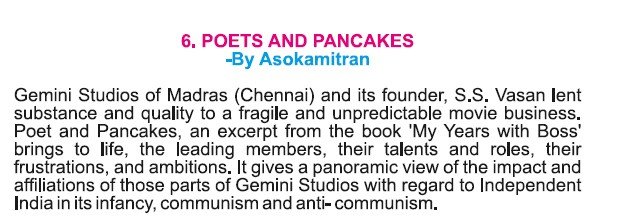
POINTS TO REMEMBER
MIND MAP
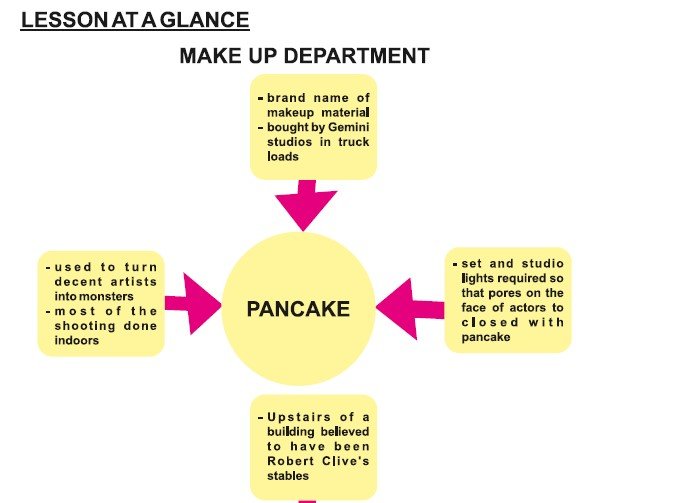
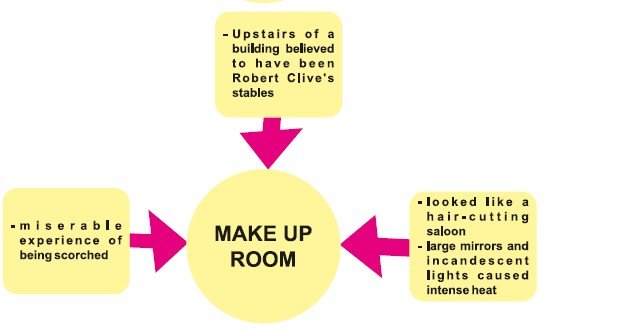
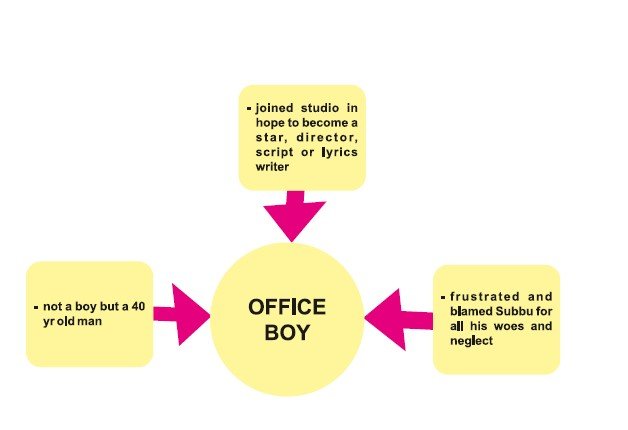
STORY DEPARTMENT
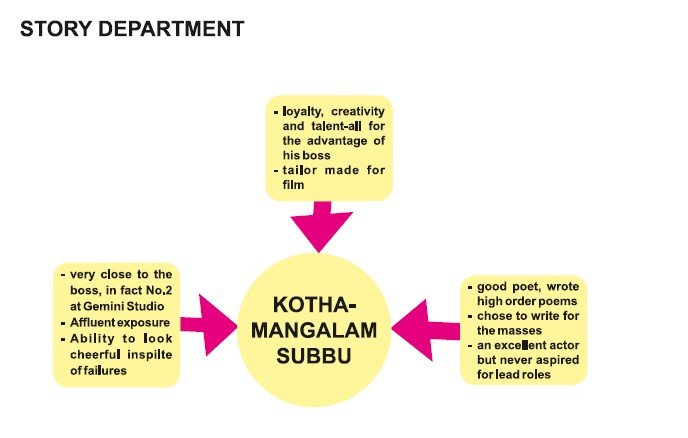
LEGAL ADVISOR
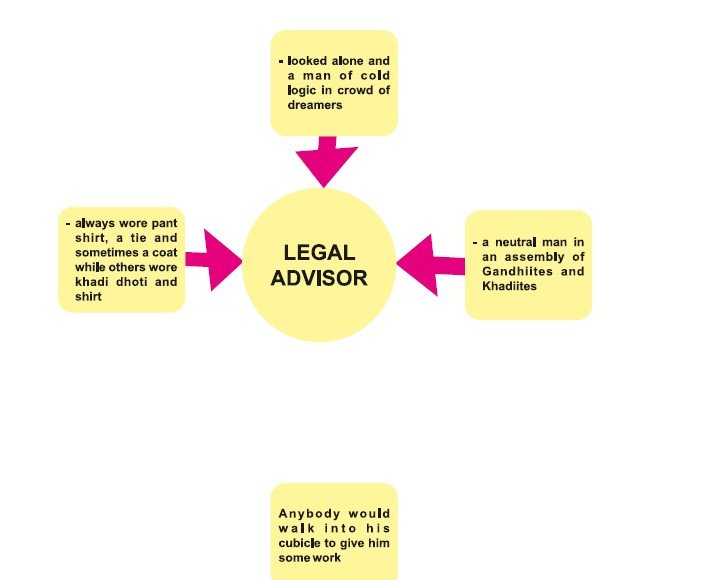

Read the passages and answer the questions given below:
RTC 1
1.In those days I worked in a cubicle, two whole sides of which were French windows. (I didn’t know at that time they were called French windows.) Seeing me sitting at my desk tearing up newspapers’ day in and day out, most people thought I was doing next to nothing. It is likely that the Boss thought likewise too. So, anyone who felt I should be given some occupation would barge into my cubicle and deliver an extended lecture. The ‘boy’ in the make-up department had decided I should be enlightened on how great literary talent was being allowed to go waste in a department fit only for barbers and perverts.
1.’|’ in the first line stands for
(i) Legal advisor
(ii) Kothamangalam Subbu
(iii) office boy
(iv) author
2.’The Boss thought likewise too’ implies that he
(i) also thought that he was industrious
(ii) never doubted his capability
(iii) had unflinching trust in him
(iv) thought the author was doing
almost nothing
- The boy in the make-up room felt disappointed because
(i) he aspired to become an actor/scriptwriter but was enrolled in make- up department
(ii) his talent was going wasted
(iii) he was involved in too many trivial jobs
(iv) both (i) and (ii) - The job of the author was to
(i) do make-up of the actors
(iii) write articles
(ii) cut newspaper clippings
(iv) perform as actor
Answer: 1 (iv), 2 (iii), 3 (iv), 4 (ii)
RTC 2
2.In all instances of frustration, you will always find the anger directed towards a single person openly or covertly and this man of the make-up department was convinced that all his woes, ignominy and neglect were due to Kothamangalam Subbu. Subbu was the No. 2 at Gemini Studios. He couldn’t have had a more encouraging opening in films than our grown-up make-up boy had. On the contrary he must have had to face more uncertain and difficult times, for when he began his career, there were no firmly established film producing companies or studios.
1.Who does ‘this man’ refer to in the extract?
2.Why did he have to face uncertain times?
- Who did he hold responsible for his woes?
- Give a synonym for the word ’embarrassment’ from the passage.
SHORT ANSWER QUESTIONS
- How does the writer describe the make-up room of Gemini Studios?
Ans. The make-up room of Gemini Studios looked like a hair cutting
salon. It had around half a dozen mirrors with incandescent lights at all
angles around them. The artists would feel the heat emanating from these lights. Thus, the writer uses the term ‘fiery misery’ to denote the uncomfortable situation of those subjected to make-up. - What was the great deal of national integration that was prevalent in makeup department?
Ans. The make-up division of the Gemini Studios was an example of national integration. According to the author, this is so because people from different regions and religious groups worked together in the same department. The department was headed by a Bengali who was succeeded by a Maharashtrian. The other helpers included a Dharwar Kannadiga, an Andhra, a Madras Indian Christian, an Anglo-Burmese and the local Tamils.
3.What does ‘The God that Failed’ refer to?
Ans. The God That Failed was a compilation of six essays written by six eminent writers, namely, Andre Gide, Richard Wright, Ignazio Silone, Arthur Koestler, Louis Fischer, and Stephen Spender. In each of the essays, the respective writers described ‘their journeys into Communism and their disillusioned return’.
SHORT ANSWER QUESTIONS FOR PRACTICE
- Which hierarchy was followed in the Make-up department
- Why was the office boy frustrated? Who did he show his anger on?
- What was the common perception of people associated with Gemini Studios about Communism?
- 5. Why did the Englishman face a silent and dazed audience? How does the mystery of the Englishman get solved?
LONG ANSWER QUESTIONS
- Subbu is a multi-faceted person and yet he has enemies. Discuss keeping in view his character in the lesson ‘Poets and Pancakes’.
Ans. In the lesson ‘Poets and Pancakes’ Kothamangalam Subbu is portrayed as a multi-faceted person but to his agony he has a lot of enemies. He is very close to the boss, in fact number 2 at Gemini Studios. He had exposure to more affluent situations and people by - virtue of being born a Brahmin. He has the ability to look cheerful in spite of failures. His loyalty, creativity and talent are appreciated by the boss. The others were at times envious of him. He is tailormade for films, film making is so easy with Subbu around. A good poet and writing poems of higher order are the other inherent qualities in him. He chooses to write for the masses. He wrote a sprawling novel ‘Thillana Mohanambal’ with dozens of etched characters. Though he was an excellent actor, he never aspired for lead roles.
- Inspite of being a charitable and improvident man, he yet had enemies.
LONG ANSWER/QUESTIONS FOR PRACTICE
1.
How could Frank Buchman’s Moral Re-Armament Army find a warm host in the Gemini Studios? Elucidate.
2.
The legal advisor unwittingly brought about a sad end to the acting career of a talented actress. How?
3.
How does the author describe the set up and working of makeup department?
Conclusion of Poets and Pancakes
To sum up, Poets and Pancakes summary, we learn about the film industry in detail and the inside functioning as well as when Independent India was in its infancy.

Recent Comments